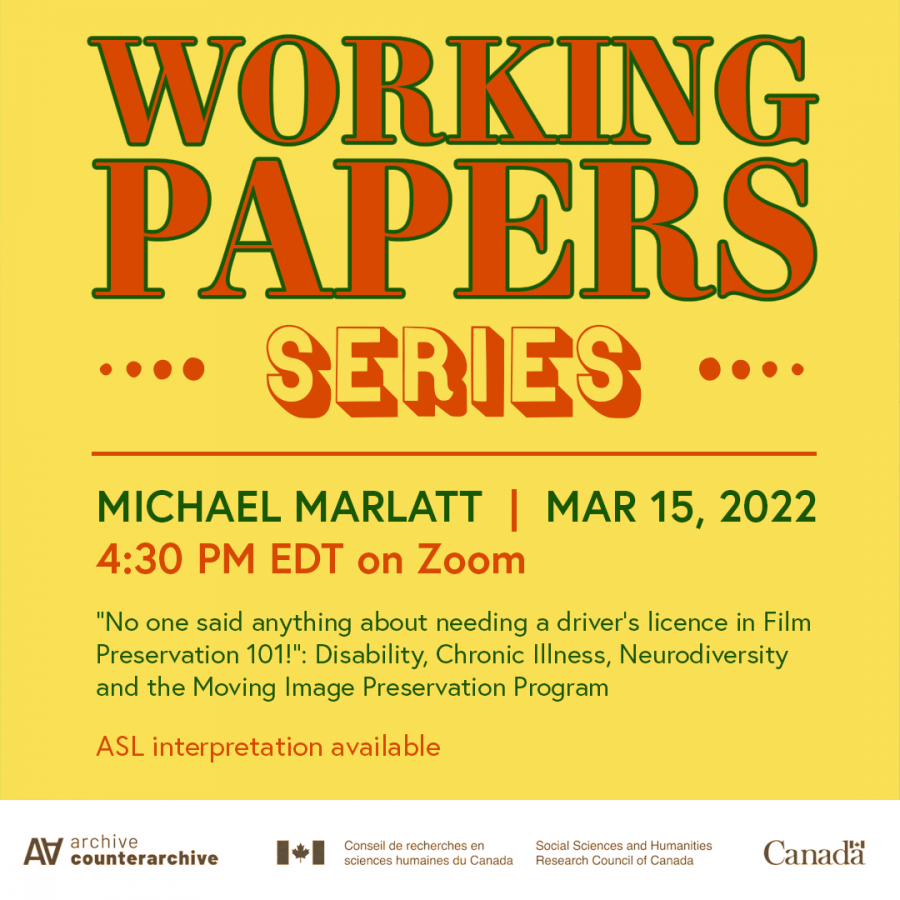March 15, 2022 4:30-6:00 PM EST
Online and free, Zoom
Join us for another online iteration of the Archive/Counter-Archive Working Papers Series, which brings together PhD students from different Universities to hear about exciting doctoral research in the area of archival studies. Our next speaker is Michael Marlatt, who is a PhD candidate in the joint Communication and Culture program at York University and X University. Michael’s talk will be followed by a Q&A with the audience, moderated by our student organizers, Emily Barton and Elisa Arca Jarque.
NOTE: The Zoom link will be emailed to all who register on March 14th.
“No one said anything about needing a driver’s licence in Film Preservation 101!”: Disability, Chronic Illness, Neurodiversity and the Moving Image Preservation Program
In a 2020 salary and demographics survey conducted by the Association of Moving Image Archivists, 7.1 percent of respondents identified as disabled, and 6.3 percent identified as neurodivergent. These rates are much lower than national averages. The actual number in the field may be slightly higher but still underrepresented due to confusion over definition or discomfort in disclosure. The survey did not make any mention of chronic illness. Both scenarios however present issues of representation, comfort, and accommodation that currently exist in the field of moving image archives. Many of these aforementioned barriers into the field begin during graduate level archival education.
Michael engages texts from disability studies, archival theory, GLAM, film preservation, all wrapped in a pedagogical shell, to examine questions such as: what is, or has been, the experience for graduate students who identify as disabled, neurodivergent, and/or with a chronic illness in moving image preservation programs in North America? What do these experiences tell us about the field of moving image preservation? How might these experiences be improved? How accessible are moving image preservation programs? Are there assumptions and barriers around accessibility that may be keeping people from even applying to these programs?
One of Michael’s goals is to examine what sort of discrepancies might exist between the ways in which administrative staff and faculty see accessibility in their programs versus the lived experience of students and alumni. Case studies include X University’s Film & Photography Preservation and Collections Management MA program; the L. Jeffrey Selznick School of Film Preservation at the George Eastman Museum; NYU’s Moving Image Archiving and Preservation MA program; and UCLA’s Media Archival Studies stream of its MLIS program.
This work is guided by Michael’s own experience as a person with epilepsy trained in film preservation.
Michael Marlatt (he/him) is a PhD candidate in the joint Communication and Culture program at York University and X University. Michael is a trained film archivist, receiving his MA from the Film and Photography Preservation and Collections Management program at X University in 2017. Michael currently serves on various committees for AMIA and ACA (the Association of Canadian Archivists). In early 2022 Michael co-founded the Accessibility Committee for AMIA. His work on disability advocacy in the moving image archive is set to be published in Spring 2022 in The Moving Image and Archival Outlook.
Please note this talk will have ASL interpretation and closed captioning.


